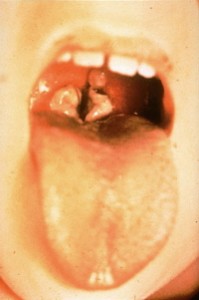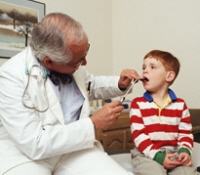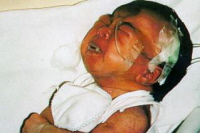
Diphtheria infection is both a bacterial and a respiratory infection caused by the Diphtheria bacterium, Corynebacterium diphtheriae and the harmful Toxins. Diphtheria infection is a dreadful childhood illness which affects the nose and throat mainly, but left untreated it can be fatal and therefore needs urgent diagnosis and treatment. The Diphtheria Bacterial infection alone destroy the mucous membrane and in its place it leaves a thick covering which causes severe swelling and inflammation of the throat. The covered membranes are then at risk of becomming detached from the throat and obsturcting the airway, causing all kinds of complications such as breathing problems and even asphyxiation. The Diphtheria Toxins separately seep into the body and attck the muscles and nervous system. Diphtheria infection is spread by droplet infection or direct contact with a person who is already infected or even a healthy carrier of the Diphtheria infection. Nowadays the Diphtheria infection is much less common due to sanitary improvements and vaccinations, but the diphtheria infection is still a highly contagious bacterial infection that can manifest quickly and spread with ease. Pre school children and the elderly are at high risk for contracting the diphtheria infection or people who live in crowded or unclean environments.
Signs and Symptoms of Diphtheria Infection
-

Difficulty swallowing and breathing
- Difficulty swallowing and breathing
- Difficulty breathing or swallowing
- Double vision
- Slurred speech
- Shock
The Diphtheria infection, in some cases it can progress further to a throat infection. These complications will affect other organs of the body like the heart and kidneys causing severe damage and may lead to paralysis.
Incubation Period of Diphtheria Infection
There is no Incubation Period associated with the Diphtheria infection.
Treatment for Diphtheria Infection

- Treatment is essential
You must contact your childs GP immediately if you or your child or family show any symptoms of the Diphtheria infection as early diagnosis and treament of Diphtheria is essential to the containment of the infection. If you are mistaken then it is far better to be safe then sorry. All Diphtheria infection patients are treated in hospital due to the severity of the infection. The child will be seen by a specialist doctor who will upon diagnosis administer the child with an anti toxin to neutralize the toxins of the Diphtheria infection. This is usually given by injection, but in some cases it can be administered through an IV. Following this the child will also be administered with antibiotics to combat the infection of Diphtheria. Depending upon the severity and advancement of Diphtheria infection children may be given a ventilator which will help them to breathe, this is very distressing for you as parents to witness, but is totally necessary.
For the Diphtheria infection that advances to the heart through the toxins then some children may be given intravenous fluids, oxygen, or heart medications to stabilise them. All Diphtheria patients are isolated and quarantined from the family members. The family are then checked also for their own safety. They will follow the same tests as those used to diagnose the Diphtheria infection via the specialist doctors and then dealt with accordingly. Even if they are clear of all symptoms of the Diphtheria infection they will still be topped up with a booster vaccination and given antibiotics as a precautionary measure. Between 40% and 50% of those who don’t get treated may die as a result!
Vaccinations for Diphtheria Infection

Vaccinations against Diphtheria Infection are strongly recommended as the childhood illness is so horrific and the complications are not worth risking. The vaccinations for the diphtheria infection are readily available through your local health centre. Administrations of the vaccinations should be carried out when the child is around 2 months, again at 3 months and then again at 4 months. The vaccinations are excellent, but are considered more effective in the HIB form which also protects against tetanus and whooping cough. You must consider the vaccinations against Diphtheria infection strongly as the illness really is a terrible ordeal for the children to go through, the treatment is also not pleasant and the quarrantine can be a terrifying experience.
